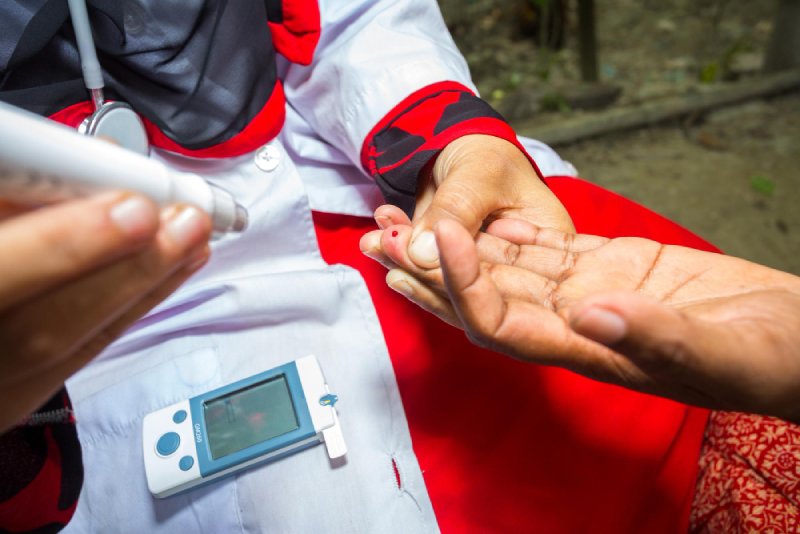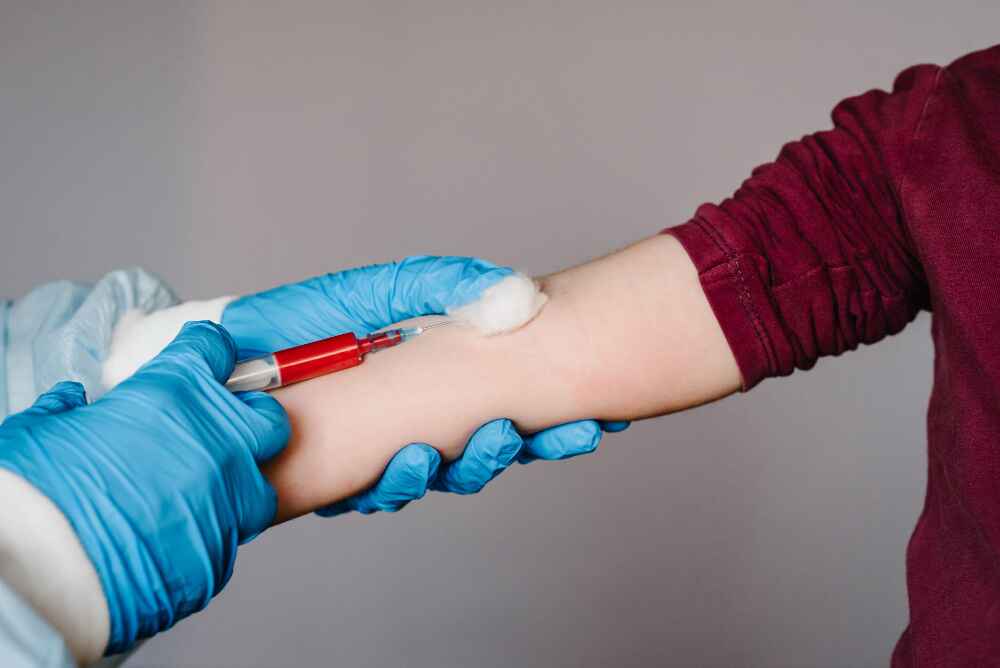Book on Whatsapp
9892101616
Understanding RDW in Blood Test: A Comprehensive Guide
Blood Test
Mon Nov 06 2023
When you undergo a routine blood test you may come across various abbreviations and terms which can be confusing at times. One such term is RDW which stands for Red Blood Cell Distribution Width. RDW is an important parameter measured during a complete blood count (CBC) test. Let's dive into the meaning of RDW, its significance, and what abnormal results can indicate.
What is RDW?
RDW refers to the variation in the size of red blood cells (RBCs) in a blood sample. It measures the difference in volume of individual RBCs and provides insights into the distribution or heterogeneity of cell sizes. The RDW value is presented as a percentage reflecting the width of the histogram curve of RBC volume.
Significance of RDW:
The RDW value is primarily used to evaluate and diagnose various types of anemia. Anemia is a condition where the body lacks sufficient healthy red blood cells to carry an adequate amount of oxygen to the tissues. RDW helps in differentiating between different types of anemia.
1. Iron Deficiency Anemia: This is the most common type of anemia and is associated with a high RDW value. In this condition, the body lacks sufficient iron to produce healthy red blood cells leading to a wide variation in the size (anisocytosis) of RBCs.
2. Vitamin B12 Deficiency Anemia: This type of anemia is caused by a deficiency in vitamin B12 which is essential for the production of healthy red blood cells. It is characterized by macrocytic (larger than normal) RBCs and an elevated RDW.
3. Folate Deficiency Anemia: Similar to vitamin B12 deficiency anemia this condition is caused by a deficiency in folic acid. Like B12 deficiency it leads to macrocytic RBCs and an increased RDW.
4. Hemolytic Anemia: Hemolytic anemia is a condition where the breakdown of red blood cells exceeds their production. In this condition, the RDW value may be elevated due to the presence of both smaller RBCs (microcytic) and larger RBCs (macrocytic).
5. Blood Loss: If there is acute or chronic blood loss the body produces new RBCs rapidly. This can result in a wide range of RBC sizes and an increased RDW value.
Interpreting Abnormal RDW Results:
RDW value outside the normal range may indicate an underlying health condition and should be further investigated by a healthcare professional. A high RDW value suggests a varied range of RBC sizes while a low RDW value indicates a more uniform distribution.
It is essential to consider RDW in combination with other CBC parameters to determine the underlying cause accurately. Your healthcare provider will assess your complete blood count results and consider your medical history symptoms and additional tests if required.
RDW is an important parameter measured during a complete blood count test and provides valuable information about the variation in red blood cell sizes. It aids in the diagnosis and differentiation of various types of anemia. If you receive abnormal RDW results it is essential to consult a healthcare professional who will interpret the findings in the context of your overall health and additional diagnostic tests if necessary. Remember timely detection and treatment of anemia can help improve your overall well-being.
Manipal TRUtest provides comprehensive diagnostic services with assured quality, accuracy, and trust backed by 70 years of Manipal legacy. You can choose our Inhalation Allergy panel which offers detection of 33 allergens. Get Home Sample Collection and a well-qualified phlebotomist shall visit you at the comfort of your home.
Related Tests
Related Packages
Related Blogs

Blood Test
Cholesterol Levels and What a Lipid Test Reveals
Cholesterol is a waxy, fat-like substance found in every cell of the human body. While it is essential for producing hormones, vitamin D, and substances that aid digestion, an excess of cholesterol in the bloodstream can pose serious health risks. Understanding your cholesterol levels through a lipid test is a crucial step in preventing heart disease, stroke, and other cardiovascular issues.
What Is Cholesterol?
Cholesterol is categorized into two main types: Low-Density Lipoprotein (LDL), often referred to as "bad" cholesterol, and High-Density Lipoprotein (HDL), known as "good" cholesterol. LDL carries cholesterol to your arteries, where it can build up and form plaques, narrowing the arteries and increasing the risk of heart attack and stroke. HDL, on the other hand, helps remove cholesterol from the bloodstream, transporting it back to the liver for excretion.
Another important component is Triglycerides, which are a type of fat found in your blood. When you eat more calories than your body needs, especially from sugar and fat, the excess is converted into triglycerides. High triglyceride levels, along with elevated LDL and low HDL, are linked to an increased risk of cardiovascular disease.
What Is a Lipid Test?
A lipid test, also known as a lipid profile or lipid panel, is a simple blood test that measures the levels of different fats in your blood. Typically, the test includes:
- Total Cholesterol: The overall amount of cholesterol in your blood.
- LDL Cholesterol: Often labelled as “bad” cholesterol because high levels can lead to plaque buildup.
- HDL Cholesterol: Known as “good” cholesterol as it helps remove LDL from the arteries.
- Triglycerides: Elevated levels can raise your risk of heart disease and may indicate metabolic syndrome or diabetes.
The test is usually performed after fasting for 9 to 12 hours, as food intake can temporarily influence lipid levels. Based on the results, your healthcare provider can assess your risk of cardiovascular disease and suggest lifestyle changes or medications if necessary.
Interpreting the Results
Normal lipid levels are typically defined as:
- Total Cholesterol: Less than 200 mg/dL
- LDL Cholesterol: Less than 100 mg/dL
- HDL Cholesterol: 60 mg/dL or higher (considered protective)
- Triglycerides: Less than 150 mg/dL
Borderline or high readings may signal the need for dietary adjustments, increased physical activity, weight management, or in some cases, medication like statins.
Importance of Regular Testing
Regular lipid testing is especially important for individuals over 40, those with a family history of heart disease, people with diabetes, obesity, or a sedentary lifestyle. Early detection of abnormal cholesterol levels can help you take proactive measures to protect your heart and overall health.
Monitoring cholesterol levels through a lipid profile test is a simple yet powerful tool in maintaining cardiovascular health. It offers valuable insights into your risk profile and can guide lifestyle modifications or medical interventions. By keeping cholesterol levels in check, you can significantly reduce your risk of heart disease and lead a healthier, longer life. Regular screening, a balanced diet, regular exercise, and stress management are key to keeping your heart strong and your cholesterol within a healthy range.
Take control of your heart health - test early, stay healthy.

Blood Test
Health Benefits of Blood Donation You Should Know
You may have seen health camps encouraging men and women of eligible ages to donate blood at least once a year. But have you ever wondered—is blood donation actually good for your health?
The answer is a resounding yes.
However, the primary motive of donating blood is to help someone in need, provide them a second chance at life. It is also surprisingly beneficial for the donor. From improving heart health to giving your body a gentle detox, regular blood donation is a simple act that offers powerful returns.
Benefits of blood donation
1. Natural cleanser: Donating blood acts as a natural body cleanser. It affects perfluoroalkyl levels and those of polyfluoroalkyl substances. It reduces skin-related disorders and encourages blood flow. It reduces acne and skin problems.
2. Improves cardiovascular health: Donating blood reduces the chances of cardiovascular issues and heart attacks. It reduces haemoglobin and iron amounts in the body, and blood pressure, and improves blood circulation.
3. Free health check-up: While donating blood at a health camp, you enjoy receiving free health checkups. Healthcare professionals understand your health vitals before the procedure. They test blood pressure and haemoglobin levels. You don’t have to pay for these checkups.
4. Promotes hair growth: After donation, the body produces new blood cells. It stimulates hair follicles while boosting new hair growth.
5. Screening infections and diseases: Health professionals screen your body to identify infectious diseases. It is a mandatory step. They test blood for a variety of diseases, including HIV, virus, malaria, etc.
6. Save lives: By donating blood, you get the opportunity to save precious lives. It includes cancer patients and those suffering from burns or traumatic injuries. You obtain their blessings.
What to do and avoid before and after blood donation?
- Have iron-rich food: Avoid fatty, unhealthy meals. They promote new blood cells.
- Pain relievers or blood thinners: Avoid them before donating blood.
- Get sufficient sleep: Take rest before donating blood. Be relaxed and avoid panic on blood donation day.
- Avoid drinking and smoking: Practice this at least two days before donating blood, as it could increase blood pressure. Moreover, it might reduce the amount in the blood.
- Avoid straining yourself: Performing rigorous exercises after donating blood should be avoided. Do not consume alcohol, smoke, or drugs for a day.
- Rest: After donating blood, A healthcare professional will supervise you. Do not lift heavy weights or perform strenuous physical activities for about hours.
Enjoy the selfless deed!

Blood Test
5 Routine Blood Tests That Help Detect Health Issues Early
Monitoring your health routinely with blood tests is one of the simplest ways to identify an issue before it becomes serious. Blood tests are helpful in providing valuable information about your body's function and can reveal areas of concern. If you're habitual in your routine check-ups, you can effectively make decisions that will benefit your health down the road.
Here are five blood tests worth noting that can help highlight health issues early on.
1. Complete Blood Count (CBC)
A Complete Blood Count, or CBC, is a standard test that looks at several components of your blood, such as red blood cells, white blood cells, and platelets. It can reveal infections, anemia, immune system disorders, and blood cancers.
Even if you feel fine, some health care providers suggest having a CBC once a year because it is part of a regular health screening. Diagnostic centers you trust, like manipaltrutest.com, offer fast, accurate, and high quality CBC tests to help you to be proactive about your health risks.
2. Blood Sugar Test
Elevated blood glucose can lead to diabetes, which can eventually lead to heart, kidney, eye, and nerve damage if lost to detection. For example, a simple fasting blood sugar test or HbA1c test provides a picture of your blood sugar control through time.
Preventing long-term complications is possible if you are diagnosed early with a blood sugar test. It will allow you to make lifestyle changes or take treatment when necessary to lower your blood sugar. If you have a family history of diabetes, then it is even more important to have your blood sugars tested regularly.
3. Lipid Profile
A lipid profile measures the levels of cholesterol and triglycerides in your blood. High cholesterol is a major risk factor for heart disease and stroke. This test checks your total cholesterol, good (HDL) cholesterol, bad (LDL) cholesterol, and triglycerides.
With early detection, you can take action by adjusting your diet, exercising more, or taking prescribed medications. Health centers offer complete lipid profile tests with clear reports and expert guidance.
4. Liver Function Test (LFT)
The liver is an important organ needed for digesting food, storing energy, and removing toxins. A Liver Function Test (LFT) will check for enzymes and proteins that can indicate how well your liver is functioning. Abnormal test results can indicate infections such as hepatitis, liver damage from alcohol or other underlying medical conditions. A regular LFT is critical, as often liver problems do not manifest any symptoms in their early stages. Regardless of whether or not you feel any pain, having your liver function checked now and again gives you peace of mind and could save your life. For peace of mind, consider having this test done once a year.
5.Thyroid Function Test
The thyroid controls your metabolism, energy, among other functions in the body. A Thyroid Function Test examines hormone levels such as T3, T4, and TSH to determine if your thyroid is underactive (hypothyroidism) or overactive (hyperthyroidism). Symptoms such as exhaustion, mysterious weight gains or losses, or mood changes could indicate a thyroid issue. Testing your thyroid health sooner rather than later allows you the opportunity to address and prevent complications that hinder your health and wellness.
Testing services such as Manipal TRUtest gives you the peace of mind of knowing that an reputable provider will have your results into the system quickly and efficiently, so you can continue to monitor your health.
Routine blood tests represent more than measurement of numbers on a report, they give a clearer picture of what is happening inside your body. Identifying health problems at the early stages can empower you with choices for your treatment; putting you in control and giving you a better chance of a longer healthier life.
When you choose to make routine health screenings a regular feature of your health through initiatives such as manipaltrutest.com, you are taking a step towards your health and a better future with less worry.
